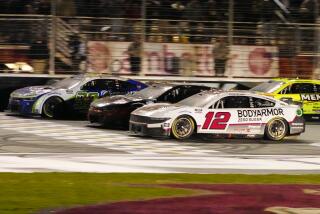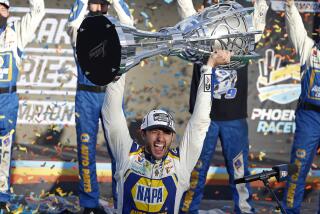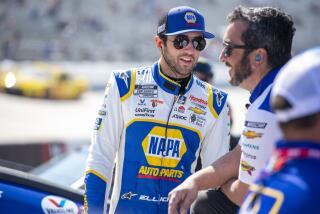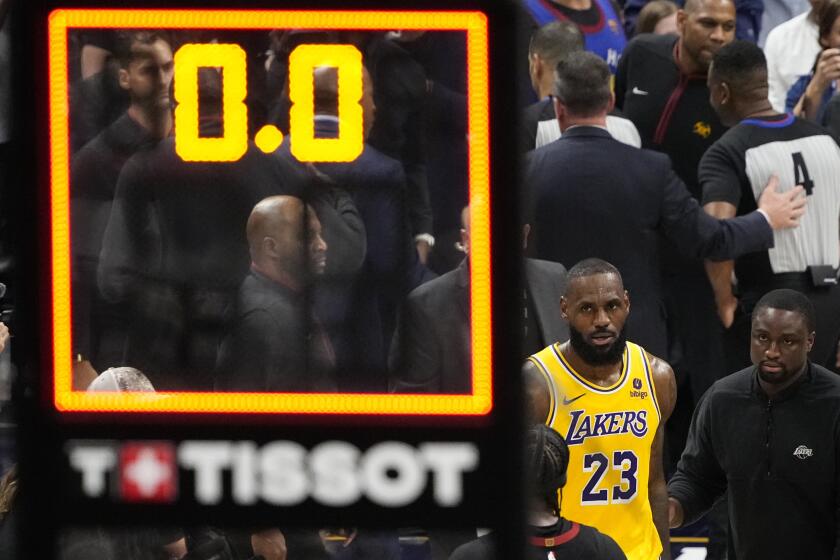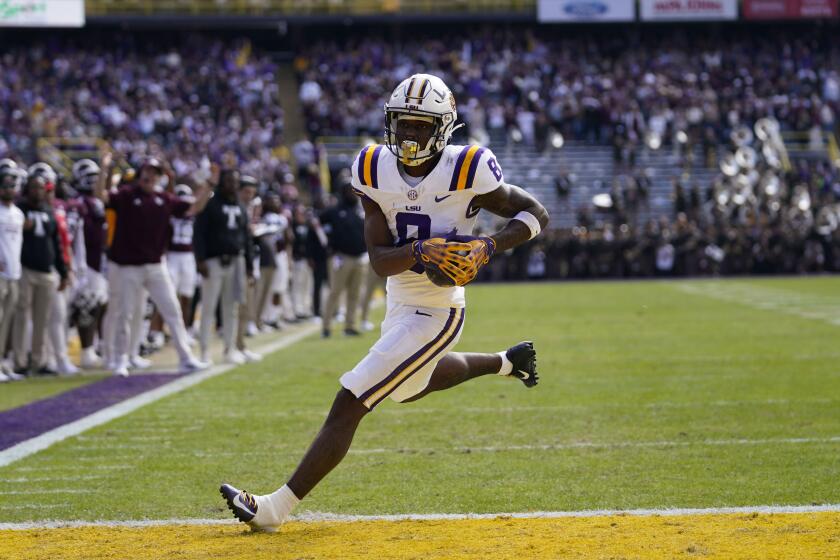NASCAR rookie Matt Tifft overcame brain tumor to fulfill his dream
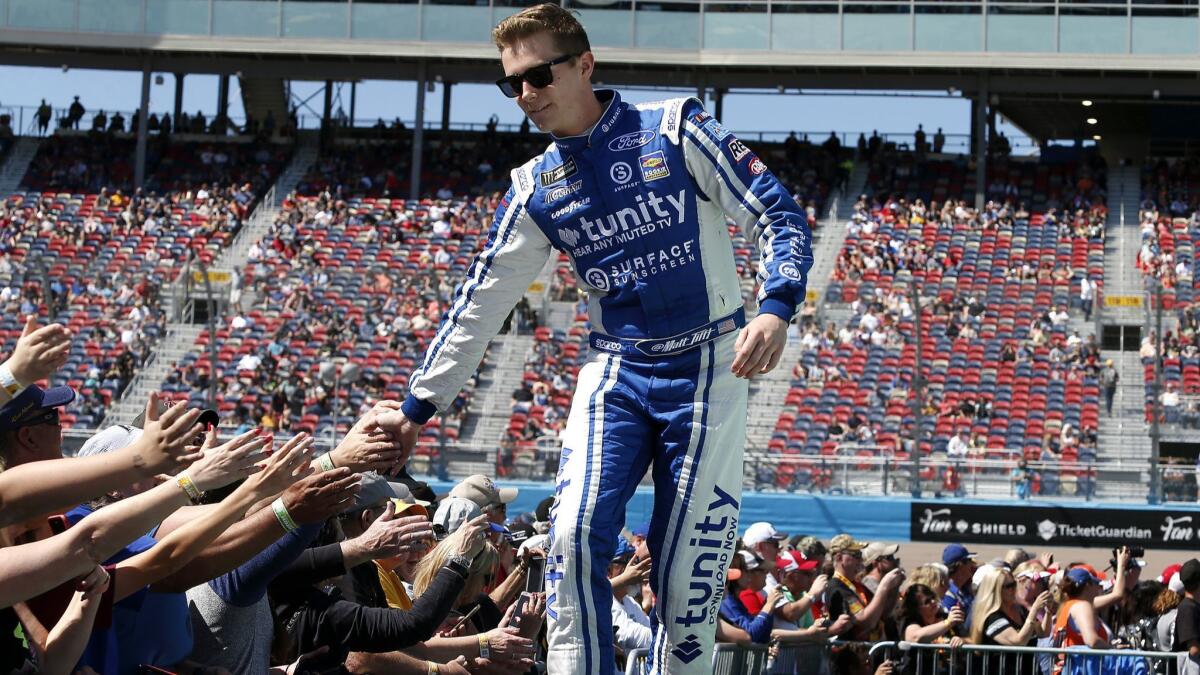
Matt Tifft was getting close to his realizing his dream — racing in NASCAR’s top series — when the symptoms started appearing.
It was early 2016. Tifft would turn on a light “and the pain of the artificial light into my head was severe.” While watching a live band, “some lights started going and all of a sudden I started going into complete claustrophobia,” he said. Tifft said he also started hearing “weird voices in my head.”
So while visiting a doctor for a bulging disk in his back, he also had a brain scan. “Sure enough, there it was” in the scan, Tifft said — a tumor in his right, frontal lobe the size of a half-dollar.
The benign tumor was removed in a seven-hour surgery, Tifft eventually returned to racing and now, at age 22, he’s in his rookie year in NASCAR’s premier Monster Energy Cup Series. He’s running at Auto Club Speedway in Fontana on Sunday in the Auto Club 400, the fifth race of the 36-race season, and Friday he qualified 32nd in the 38-car field.
Austin Dillon won the pole with a lap of 180.081 mph on the two-mile oval, Kevin Harvick will start second and Aric Almirola third.
Tifft got his start at age 11 when he began racing go-karts near his hometown of Hinckley, Ohio, near Akron. He kept working his way up the ladder — super late model stock cars, the ARCA Series and then NASCAR truck racing.
By 2016 he had advanced to NASCAR’s second-tier Xfinity Series when the tumor’s symptoms appeared. Shortly after the surgery, Tifft said his doctors told him “your progress from the surgery itself is good but there’s a very good chance that you’re probably never going to drive a race car again.”
He proved them wrong, but initially, Tifft had to fight through the pain.
“Every single thing I did, it felt like somebody was taking a dagger and tattooing into that spot, like re-imprinting into my brain, whether it was TV, music or going to the mall,” he said.
One day at the mall, “somebody dropped a spoon and set it off; I couldn’t take it and had to go home,” Tifft said. “It would make me nauseous, it would make me tired. Everything was sensory overload.”
The problems eventually subsided and Tifft passed the requisite tests to see if he could resume racing. His eyesight and reflexes remained largely intact, although he also struggled at first with depth perception.
He’s on a high-fat diet — “it helps my brain as a preventative measure” from the tumor returning — and Tifft has weekly acupuncture treatment. But he doesn’t have to take any medicine.
Don’t look for Tifft in the front of the pack Sunday. Besides being a rookie, he’s driving the No. 36 Ford Mustang for one of the lesser-funded teams, Front Row Motorsports, that’s owned by Bob Jenkins, a millionaire Tennessean.
Tifft’s best finish this season is 20th, which he achieved last weekend at Phoenix. Front Row, with a budget one-third the size of powerhouse teams such as Hendrick Motorsports, not only must pinch pennies on testing and equipment but also leans on its drivers, which include veterans Michael McDowell and David Ragan, to help recruit sponsors and promote the ones it has.
Tifft seems suited for the job. He’s at ease in front of a camera and said “where I find the fun outside of the car is trying to create relationships with brands ... and that fits perfectly with Bob’s model.”
Jenkins, in turn, said he views Tifft “as the driver who has the most upside for our organization” and is “eager every weekend to make a name for himself.”
“Matt is a fighter; he’s determined,” Jenkins said in an email. “He’s also mature. He’s experienced a life-altering event with the brain tumor at an early age.”
This weekend Tifft and Front Row are hoping to at least repeat their performance at Phoenix because finishing in the top 25 is one of the “little victories that are big for a smaller team,” Tifft said. “You have to fight for those top 25s, and that’s what we need to focus on.”
More to Read
Get our high school sports newsletter
Prep Rally is devoted to the SoCal high school sports experience, bringing you scores, stories and a behind-the-scenes look at what makes prep sports so popular.
You may occasionally receive promotional content from the Los Angeles Times.
